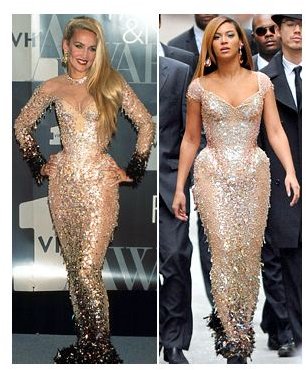Beyonce Knowles' Dress Size: What's the Big Deal, Anyway?
Our society is unfortunately known for tearing down women who don’t look like sticks, and it seems that the legendary beauty of Ms. Beyonce Knowles was recently called into question when she wore the dress pictured here.
The Story
After she’d been photographed in early March 2009 in New York, the press tore her to shreds, saying she looked “deformed” in the dress and had obviously gained weight.
According to her representative, Ms. Knowles’ dress was originally designed for Jerry Hall (also pictured), who has a different figure. In fact, despite the press’ claims to the contrary, Ms. Knowles has a very healthy body.
“This is not a weight-gain issue,” her rep told US Magazine. “Beyonce is in the best shape of her life. The exaggerated hips are a design element of a truly couture dress. Beyonce has always loved this dress.”
In fact, said Thierry Mugler, the dress designer, Ms. Hall’s dress had a 23 inch waist, while Ms. Knowles’ dress had only a 19 inch waist. And, the designer concurred, the dress has padded hips, which are meant to emphasize a woman’s waistline, as well as being part of the couture design.
Talking to Your Kids
It may not seem necessary to discuss Beyonce Knowles’ dress size with your kids, but it might be beneficial to do so. As our society tends to favor thin and shapeless (or artificially inflated) women, our daughters are getting the short end of the stick. Their self esteem can suffer each time a beautiful woman is put down for being a healthy weight.
Explain to your children that these “Hollywood” ideals simply aren’t realistic. If you need to, pull out the old height and weight charts. Show your child pictures of “real” women (like Ms. Knowles) and help her to see that true beauty is unique to every individual and cannot fit within any standard.
While the media has made some strides in portraying women as more positive role models by showing more intelligent and strong women, the Barbie syndrome is alive and well. Girls today need support if they expect to make it to adulthood with their self-esteem intact.
And, according to a recent report from the Media Awareness Network, girls are being over-sexualized too early. This can cause self-esteem issues not only for young girls, but also for grown women. Why?
“The pressures on girls are exacerbated by the media’s increasing tendency to portray very young girls in sexual ways,” says the report. “Over the past decade, the fashion industry has begun to use younger and younger models, and now commonly presents 12- and 13-year-old girls as if they were women.”
